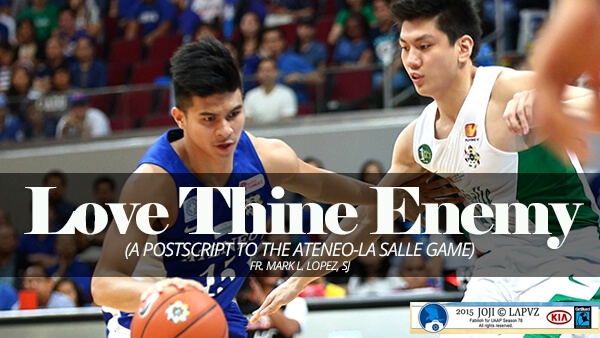


Fr. Mark Lopez, SJ
October 6, 2015
I have always wondered whether this rivalry was of any good for us, really. Rivalry, as Girard tells us, is what leads to violence. And that, we already have too much of these days. And so perhaps the question to ask is “Could it be that all of the fuss about Ateneo vs. La Salle is something that we will really be better off without?”
At its worst, this rivalry made us into real enemies. We were conditioned to seethe and curse and want to hurt somebody at the sight of a sea of either blue or green. Images of parking lot violence after a basketball game, or many a friendly party gone bad with fistfights and whatnot echo from stories told of the 70s and 80s when the rivalry was rabid. While we can be thankful times have changed and the animosity perhaps is now less physically hurtful, the slandering, the putdowns, the insults, the curses (and now the occasional cyber bullying) remain.
Rumour has it that this rivalry all started with a few FSC brothers and Jesuit Fathers (who were actually friends living in the same seminary house) imagining ways to make life more exciting and challenging for their students. In short, they were bored, and so like the Greek Gods decided to stir up a commotion among their subjects. (To find out whether or not this is true, you’ll have to read the rest of the book to which this piece served as a foreword.) If this were so, then we’ve been duped into a senseless construct of enemy-hood, haven’t we? Is it time to drop the illusion, then?
Maybe not. For here, in this rivalry is also where we have found sportsmanship and learning a genuine respect for the opponent and an admiration of his or her strengths. There is learning to help each other in times of great need. There is working together toward bigger goals, like the country and building it up for the poor, the downtrodden and the calamity-stricken. There is the discovery that we are not too different at our roots after all, with spiritualities of service and being men and women for others at both our cores. While I wouldn’t go so far as to say that we have learned to like each other, I would say, that perhaps there is something greater that has manifest in all of the above. In the ways we have grown to honour each other and learned to play fair, in how we have cooperated to build the nation together and worked for the common good, in the ways we have helped each other get up after a fall and learn from each other’s strengths – perhaps there is a greater something there.
And if indeed there is something there, then perhaps this rivalry has become the ground on which we have learned to take on Jesus’ most difficult, most incomprehensible, most counter-intuitive of commands. And if only for this then maybe we can remain enemies after all, so that we can keep learning to love the way Jesus taught us and did. If for this alone, then this rivalry might just all be worth it.
This piece was originally written as a foreword to RJ Ledesma’s recent book “Blue Babble, Gang Green: An Ateneo-La Salle Rivalry” published by Anvil Publications.